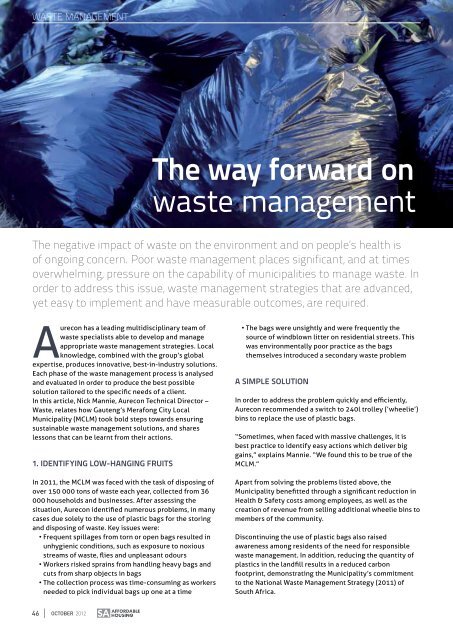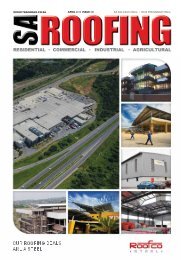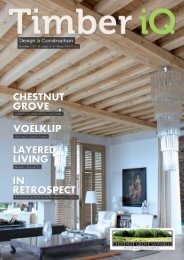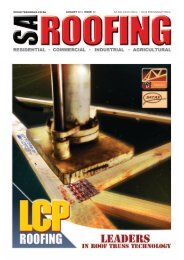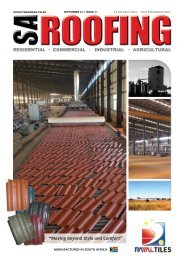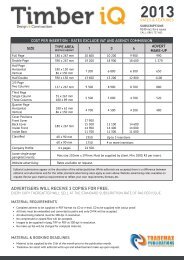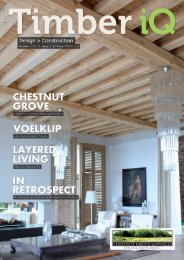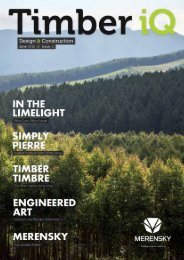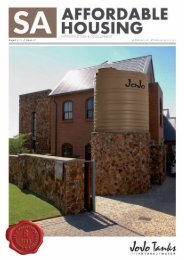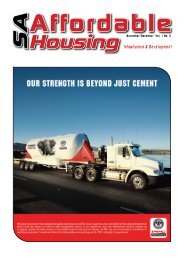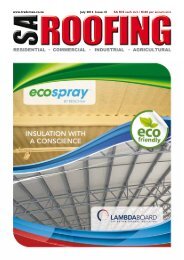waste managementThe way forward onwaste managementThe negative impact of waste on the environment and on people’s health isof ongoing concern. Poor waste management places significant, and at timesoverwhelming, pressure on the capability of municipalities to manage waste. Inorder to address this issue, waste management strategies that are advanced,yet easy to implement and have measurable outcomes, are required.Aurecon has a leading multidisciplinary team ofwaste specialists able to develop and manageappropriate waste management strategies. Localknowledge, combined with the group’s globalexpertise, produces innovative, best-in-industry solutions.Each phase of the waste management process is analysedand evaluated in order to produce the best possiblesolution tailored to the specific needs of a client.In this article, Nick Mannie, Aurecon Technical Director –Waste, relates how Gauteng’s Merafong City LocalMunicipality (MCLM) took bold steps towards ensuringsustainable waste management solutions, and shareslessons that can be learnt from their actions.1. Identifying low-hanging fruitsIn 2011, the MCLM was faced with the task of disposing ofover 150 000 tons of waste each year, collected from 36000 households and businesses. After assessing thesituation, Aurecon identified numerous problems, in manycases due solely to the use of plastic bags for the storingand disposing of waste. Key issues were:• Frequent spillages from torn or open bags resulted inunhygienic conditions, such as exposure to noxiousstreams of waste, flies and unpleasant odours• Workers risked sprains from handling heavy bags andcuts from sharp objects in bags• The collection process was time-consuming as workersneeded to pick individual bags up one at a time• The bags were unsightly and were frequently thesource of windblown litter on residential streets. Thiswas environmentally poor practice as the bagsthemselves introduced a secondary waste problemA simple solutionIn order to address the problem quickly and efficiently,Aurecon recommended a switch to 240l trolley (‘wheelie’)bins to replace the use of plastic bags.“Sometimes, when faced with massive challenges, it isbest practice to identify easy actions which deliver biggains,” explains Mannie. “We found this to be true of theMCLM.”Apart from solving the problems listed above, theMunicipality benefitted through a significant reduction inHealth & Safety costs among employees, as well as thecreation of revenue from selling additional wheelie bins tomembers of the community.Discontinuing the use of plastic bags also raisedawareness among residents of the need for responsiblewaste management. In addition, reducing the quantity ofplastics in the landfill results in a reduced carbonfootprint, demonstrating the Municipality’s commitmentto the National Waste Management Strategy (2011) ofSouth Africa.46OCTOBER <strong>2012</strong>
waste management2. Optimisation of waste collection servicedeliveryA major problem many local municipalities face is theissue of service delivery.“The MCLM was challenged by one service area inparticular – that of their waste collection process,” saysMannie. “Once the Municipality had addressed theimmediate challenge of replacing plastic bags with wastecollection bins, they needed to arrive at a holistic solutionto their broader waste collection challenges.”In dire need of a tool to optimise the allocation ofresources and improve efficiency, the Municipalityengaged Aurecon to investigate and develop amanagement system for the improved collection of wastein the local municipality area.Aurecon’s team, made up of Nick Mannie, Kobie Pretorius(Project Manager), and Hentie Viviers (GeographicInformation System (GIS) and Data ManagementProfessional) undertook to completely review theMunicipality’s waste management procedures, andimplement a sustainable scheme with substantial benefitsfor all the stakeholders.A holistic solutionThe solution lay in an effective information system thatcould measure service delivery at any given time. The newcollection system was based on customised GIS modellingaccording to the MCLM’s specific requirements.The system was designed to take into account variousfactors, such as the geographical area (location,population size, and distance to the landfill or transferstation), future developments in the city, potentialpopulation growth, the timing and frequency of wastecollection and, of course, the client’s resource allocation.The GIS modelling for optimal route planning is aconsiderable improvement on the Municipality’s existingapproach, which had been to randomly designate certaindays for collecting waste in certain areas. With this newlydeveloped system, Aurecon was able to assess factors suchas risk areas, inefficiencies and costs that were incurreddaily during the waste collection process, and report backto the MCLM on their findings with innovative andpractical recommendations.The latest information on all the solid waste sites andservices within the jurisdiction of the Municipality wasalso incorporated into a database, allowing for thecomprehensive compilation of best waste managementpractices.“The system we developed can now govern wastecollection in order to make it optimal, through thecalculation of factors like waste generation per suburb andthe number of the rubbish trucks required,” explainsMannie.Aurecon’s GIS mapping and database also assisted theMunicipality strategically in terms of long-term planningto ensure that resources, equipment and personnel will beefficiently utilised.Some of the wide-ranging benefits of the system’soptimised route planning were:• The MCLM’s collection backlog was eradicated• The risk of drivers missing areas or collection pointswas eliminated• Travelling distances were lowered, reducing chances oftruck breakdowns and significantly reducing fuel costs,which in turn effectively lessens the MCLM’s overallcarbon footprint• Productivity improved: the revised time schedulingdemonstrated that the waste collection service couldbe maximised by implementing an additional shift perday. The use of equipment and personnel moreefficiently neutralised the amount of overtime taken bymunicipal workers and the new system motivated themby allowing them to leave work early if they hadcompleted their routing for the shift• Customer satisfaction improved with the wellorganisedcollection of waste, reflecting in minimisedcomplaints from the 36 000 residents• In addition, the MCLM is now better equipped toidentify potential problems in advance and take timelypreventative measures by re-optimising the routes3. Lessons learntWhen reviewing the way in which the MCLM handled theirwaste collection challenges, two important lessonsemerge:• Making small, simple changes (such as replacing plasticbags with bins) all the way through to a completeredesign of the current working system (as with a newwaste collection route planning system) all have aplace in the adoption of a holistic view of wastemanagement.• Instead of incorporating waste management only as ameans of cleaning up a messy and unhygienic situation,it is far smarter and more cost-effective to avoid thesituation by integrating an effective wastemanagement plan from the start.“Aurecon not only has the experience and capability inwaste management, but we also ensure we understand aclient’s precise needs and consider all the relevant factorsin order to develop the most suitable combination ofinfrastructure and services. This approach results insolutions that are comprehensive, realistic, effective andsustainable,” Mannie concludes.OCTOBER <strong>2012</strong> 47


